- Home
- Kim Newman
An English Ghost Story Page 22
An English Ghost Story Read online
Page 22
Kirsty didn’t know what to do.
This hadn’t been covered in the meeting. This wasn’t on the agenda. This wasn’t in the user’s manual.
Jordan wasn’t alone. Shadows danced with her, winding around her arms and torso. She was a priestess and an executioner.
Steven might die.
Steven should die.
Finally, Kirsty admitted it to herself. The best thing would be to wipe the slate. Get rid of this family and start a new one. There was no hope. She had been pretending since for ever that it could be pulled together, but it couldn’t. If it came to this, she would stand back and let it happen.
Jordan would be taken away.
That just left…
Tim.
(The top drawer. He would fit into the top drawer.)
The boy was on the other side of the room, also watching. He shouldn’t see something like this.
She wanted to go to him.
Instead, Tim came forward and slipped the loop of his catapult over his sister’s head. He pulled back. The rubber went tight across Jordan’s throat. She was bent back. Her hands lifted from Steven’s face. She turned, growling…
* * *
It was only his sister. Jordan. Not the IP, not the hostiles. It had probably been her all along.
Now, she was distracted from Dad.
He twisted the U-Dub in his hands, noosing the rubber. He had the reins on her, but she was bigger than him, stronger than him, and mad.
Jordan stood, the rubber rope stretching between them. Tim had to keep hold of the U-Dub.
‘What did I ever do to you, Timbo?’ she asked.
‘It’s not me,’ he said. ‘It’s us.’
Jordan had friends among the hostiles. They were with her. As she towered over him, they pressed behind her shoulders, peering over and down. The Smile was among them, and the Ipkick, and the Brown Man.
She took hold of the twisted strand of rubber and yanked. He held fast.
Dad rolled out of the way. He was hurt.
‘Children,’ said Mum, bored. ‘Don’t fight.’
That wasn’t going to help. Mum had long ago resigned any authority. The last battle would be between Tim and Jordan.
And Jordan would win.
She was closest to this place, to the Hollow. He had tried, but she’d found the way.
She tugged. The sweat-greased handle of the U-Dub slid out of his fist. The wooden Y-fork hung around her neck like a pendant. It revolved as the rubber string unwound.
Jordan wiped her hair away from her face. Her head looked like a skull in a wig, with rolling marbles for eyes.
Then she was just his big sister.
Tim wanted to cry. He wanted this game to stop now.
* * *
This wasn’t the way. Jordan’s throat was almost closed and her eyes hurt. She wasn’t angry. She didn’t feel better. Nothing had changed.
Except Tim.
Dad was a monster and had to be stopped. But Tim was a kid. Nothing was really his fault. He was just susceptible to outside influence.
Tim was blinking, mouth going in and out, bubble forming in one nostril. He wasn’t a soldier any more.
She remembered the shrews.
What had that been about?
No matter how she turned, the knots got tighter. She couldn’t trust her parents or her brother not to hurt each other or themselves.
Could she trust herself?
Dad had hit her. She still felt the clap against her jaw, shaking her whole head.
And she had lost her temper.
Attacking Dad to save Mum, she’d not been herself. She had shown the Drearcliff Grange spirit, sticking up for the bullied.
The worst thing was that she was losing herself.
Who was she? Jordan. Really?
As the room grew dark, she was afraid. Now she had to be strong for everyone.
She knelt in front of Tim and tried to form a smile, tried to project reassurance.
‘You’re scaring me,’ he said.
* * *
‘What time is it?’ Steven asked.
It hurt to talk around his broken tooth from yesterday and loose tooth from just now. He had other pains, though he didn’t think Jordan had broken any bones. Just covered him in bruises.
Kirsty looked at the inside of her wrist, frowned, then shook her watch.
‘It’s dead,’ she said. ‘It can’t be later than three. We’ve lost lunchtime.’
That frightened him. He was hoping he’d blacked out for hours. That would explain what was troubling him.
‘Why is it dark outside?’
Kirsty looked through the picture windows. The orchard was dusklit, greens and reds turned to greys. The sky was slate.
‘Summer storm,’ Kirsty said. ‘It’ll bucket down soon. It hasn’t really rained since we’ve been here.’
He didn’t think she was right. It was nightfall.
That didn’t mean it wouldn’t bucket down, though. He thought it would, and more than rain.
He was on the chaise longue, sticking plasters over the cuts on his face. He wanted to scratch them away, but kept his hands down.
Jordan’s fury was burned out for the moment.
He didn’t know what to do about her. Or to her. He had struck first and she’d fought back, subscribing to the theory of massive retaliation.
She stood by the French windows, gazing out at the gathering dark as if it were calling to her.
Tim flicked the light switches by the door. The three bulbs strung from the beams came on, fizzed and popped. Tim flicked the switches off. Fragments floated down. Smoke curled around the beams, pooling on the ceiling.
The overhead lights were a Naremore addition, to replace Louise’s dreary standing lamps. Those were back, exactly where they’d been before he shifted them into a junk room. Steven nodded to one and Tim went to it. He reached up, on tiptoes, found the pull-cord and, nervously, gave a tug.
The lamp came on and didn’t pop.
There were three other lamps. Tim went round to each, turning them on. This made for a brightly lit area, but a cavern of dark above. Looking up, Steven no longer saw the beams. Louise’s useless chandelier hovered like an ornate flying saucer. The Summer Room felt like a primitive campsite, mammoths and sabre-tooths prowling beyond the circle cast by the fire.
The picture windows became a dark mirror, reflecting the room back at them. The trees beyond were the merest ghost-shapes, standing among furniture and people.
In the window-mirror, they weren’t alone. Some reflections were familiar. Others weren’t.
He tried to count heads, but couldn’t.
Bernard Wing-Godfrey was in the crowd. When Steven looked at the window, the brown man was there, somewhere in the room, but when he tried to find him this side of the looking glass, Wing-Godfrey was gone.
Steven forced himself to ignore the window-mirror, drawing mental curtains. He concentrated on the room.
Louise’s antique telly was back. His equipment was piled up by the fireplace, like wood. The VCR was plugged in, but its timer flashed 88s. The heavy clock on the mantel, which they had left where it was, had no hands.
Tim was the one he could count on.
‘Go round the house, check all the clocks, everything with a timer. The central heating box, the fax machines, uh, the microwave. Find out what time it is.’
Kirsty put a hand on Tim’s shoulder.
‘Not alone,’ she said. ‘He doesn’t go alone. Steven, I mean it.’
‘I don’t think we can be alone here.’
‘Yes. That’s why one of us goes with him.’
The problem was Jordan. She might go off at the slightest provocation. Obviously, she couldn’t be trusted with Tim. But if Steven or Kirsty went – and he wasn’t sure he could get up some of the stairs in his state – then the other would be left with their daughter.
They couldn’t all go.
Maybe it didn’t matter. Whatever the clocks sa
id, it was nightfall at the Hollow.
* * *
‘The television, Tim,’ said Mum. ‘Turn it on and go to Ceefax for the time.’
Tim nodded and went to their big-screen TV, which was shoved back by the fireplace. He reached for the on-switch. He’d need the handset to look up Ceefax, but it was in its holster by the screen.
‘No,’ shouted Dad. ‘What if it goes off like the lights?’
Tim hesitated. He could still hear the popping of the light-bulbs. Inside the television set was a kind of a big bulb. It could explode with killing force, projecting glass shrapnel.
‘The Hollow isn’t comfortable with anything new,’ said Dad. ‘It likes Louise’s things.’
‘I don’t think that’s true,’ said Mum. ‘It’s not the house. It’s you. All of you. You’ve turned against it and it’s wary of you.’
‘Try her telly, Tim,’ said Jordan, sounding normal. She meant the strange contraption that had reappeared in its old place. It was the size of an oven, wooden, with a small convex screen, rounded at the corners.
Tim stood in front of the box, which was taller than him. When they first moved in, he’d switched the TV on experimentally. Mum and Dad had laughed when he jiggled knobs trying to make the colour come on.
Once upon a time, before the War, television was black and white.
He turned a dial rather than pushed a switch, and stood back.
It took long moments for the TV to come on, ‘to warm up’, Mum had said.
A blurry, harsh black-and-white vision formed.
Two strange puppets bobbed around a giant plant with a face. Was this television a Punch and Judy show, with a midget concealed inside, working the strings?
‘Bill and Ben,’ Dad said.
‘…the flower-pot men,’ Mum finished.
Tim found the two puppets frightening. Men made out of flower-pots, with girlish faces. He switched the channels and found a still picture of circles and squares in a pattern, then wrestling, then nothing, nothing, nothing, nothing.
He turned to his parents, dismayed.
‘Where are the other channels?’ he asked.
Mum and Dad wanted to laugh again, but couldn’t.
He kept clicking. No Ceefax. Nothing with a clock.
‘What time is it?’ he asked, babyish tears in his eyes.
‘“Time to go home, time to go home”,’ Mum crooned, horribly.
‘“Time for bed, said Zebedee”,’ said Dad.
This was something adult, hidden from him. It frightened and annoyed him. Whenever Mum and Dad tried to act like kids, they were creepily wrong, like the flower-pot men.
White static washed across the screen. Tim stepped away from the old TV.
He was afraid of what it would show him in black and white.
* * *
Mum and Dad had lost it. And Tim. Jordan had to be on her guard every moment, in case they struck at her. She’d been forced to fight back, much as she hated it.
It was night-time again.
Dad was right: it had come too early. But the Hollow wasn’t the rest of the world. It had its own time, its own climate, its own rules.
She hated the family’s rules but at least she knew them. Here, she didn’t know from moment to moment who her friends were, what everyone was playing at.
She had only herself.
(Was that enough? Wasn’t she weak, fat, useless? In the end, wouldn’t she let herself and everyone down?)
She couldn’t see the orchard through the windows. They could have been painted black.
Her own face, flabby and unappealing, gawked back at her. Spots were showing up, around her mouth and on her forehead. No wonder she’d been dumped. No wonder no one cared about her.
As she looked, her face flowered, bloated.
She touched her cheeks, not feeling the weeping blemishes, then put her fingers on the cold glass of her reflection. She turned away, putting the image behind her.
The telly was tuned to nothing. Snow.
Mum tried the phone. Jordan heard static across the room. Mum jiggled the cradle, the way people did in films after losing a connection or when the wires were cut. Did that ever work? Mum listened for a minute, failing to get a dial tone, and put the telephone down, sadly.
‘I guess the modem and the mobiles are out, too,’ Dad said, angry.
‘Or they’re dangerous,’ put in Mum. ‘Damn things.’
It wasn’t fair. Their things blew up, but Louise’s didn’t work.
The telephone rang, once. Then, again. It kept ringing, each pause between bell-jangles long enough to make her think (hope) the caller had given up.
Who could it be? Someone phoning from a long, long way away.
‘You better answer it,’ said Dad, relying on his invalid act to keep him on the couch and out of danger. Mum looked horrified.
Again, plucky little Tim stepped in.
‘The Hollow,’ he said.
A serious, miniature-adult frown creased his face as he listened to the insect buzz on the other end. He nodded, not saying anything, then held out the receiver.
‘Jordan,’ he said. ‘It’s for you.’
Her skin chilled, sweat turned to frost.
Tiny breathing sounds came from the receiver.
Slowly, as if wading through mud, she walked across the room. Lightbulb splinters stuck to her bare feet, pricking not stabbing. The distance between her and Tim narrowed but lengthened.
Tim’s outstretched arm extended, unnaturally.
A thousand miles of carpet and flagstone passed under her. She tuned out the television and whatever Mum and Dad were saying. As if in a space-suit, she heard only her own breath and tiny sounds from the telephone. Impatient tutting and tapping.
She took the phone and put it to her head, hooking her hair out of the way, turning her back on her family, the cord winding around her.
‘It’s Jordan,’ she said.
‘Kiss kiss kiss,’ hissed the phone.
Ice bullets exploded. She dropped the receiver. It plunged slowly, then broke on the stone floor. Bakelite fragments and cardboard and metal discs.
It had been Rick.
* * *
The mood of the Hollow was changing. The exploding lightbulbs, the telephone call that had shocked her daughter. Until now, it had all been a magic show, put on to delight and amaze, perhaps even awe and terrify. But the bulbs could have hurt someone – Jordan’s dirty bare feet had splinters in them – and the call was worse. Curled on the sofa, Jordan hugged her knees, hair over her face, shuddering uncontrollably.
‘You’re in danger now,’ said Kirsty.
Steven looked at her as if she’d said something stupid.
‘Before, you weren’t, not really. It was exciting, wasn’t it? Intriguing. As if you were all feeling it out, the Hollow. Now, it’s darting at you, like a snake, or like a cat with a mouse.’
Her husband looked around the darkened Summer Room.
‘What do you mean, “you”?’ Steven asked.
Kirsty didn’t need to explain. The Old Girl was still on her side.
‘Come out, you chickens,’ Steven shouted.
There was no reply.
‘Don’t, Steven,’ she said. ‘Don’t annoy them any more.’
‘Them?’
‘Them. It. The ghosts. The Hollow.’
He looked at her, paying attention. Was she getting through?
‘This place is not alive, Kirst. We’re not the only people here.’
No. He didn’t understand.
‘They want us out of here. Well, we shan’t be shifted. This is my house, my home, and I will not be intimidated in it.’
Had she ever known what Steven was thinking? Really?
‘Come on out,’ he shouted. ‘It’s all over. We know your game.’
Jordan peeped up through her hair, eyes rimmed with red.
‘It’s them, Kirst,’ Steven said. ‘The After Lights-Out Gang. You know what gave them away? The name.
The bloody stupid Weezie Louisey name. After Lights-Out. That’s when they go to work and that’s exactly what they’ve done. They’ve put the lights out. Now, Bernard Wing-Godfrey is up there somewhere, in the eaves and attics. He knows this house better than we do. They’ve all studied the place, in the books and probably in the floor-plans. I don’t know if it’s just Wing-Godfrey, but he’s certainly here somewhere. I’ll bet a couple of the others are lying in wait. They’ll have white sheets on with eyeholes cut out, and chains to clank, probably dogs with luminous paint-masks.’
Kirsty was appalled at the way her husband’s mind worked. It would do no good to ask how the After Lights-Out Gang had managed to make the sun set at three in the afternoon. He would have an explanation. The lights were rigged to explode, the phones were tricked up with high-tech gear, and the sun was on a dimmer-switch.
‘They want our house, Kirst,’ he continued. ‘Always have. They want to turn it into a shrine. We must have got in before they could put their bid together. Now, they think they can run us off the property and pick it up for a song. They’ve made a huge mistake, Kirsty. Oh yes they have. This might have worked on someone else, on someone superstitious, on someone stupid. But it can’t touch me, it can’t touch us.’
‘The bulbs exploded, Steven,’ she said.
‘And your point is?’
* * *
Dad was convinced. His cracked explanation solved everything, which meant he didn’t have to be afraid any more.
‘It doesn’t matter who’s doing this, Dad,’ said Jordan. ‘Or how it’s being done. It doesn’t matter how you’re haunted, whether it’s by ghosts or men in sheets. Mum is right. The bulbs exploded. That could have hurt us. Before then, it was all us. Tim broke the window. You hit me. I, ah, hit you. We were only hurting ourselves. All the ghosts ever did was pick up on the way we were, prod us into being more extreme. The worst they could do was haunt us, frighten us. That’s all over. This isn’t about frightening us any more. This is about hurting us, harming us.’
‘Killing,’ said Kirsty.
The word was there. In the room, between them. Tim was at attention, fidgeting now he no longer had his catapult.
‘Yes,’ Jordan said. ‘That. Killing us.’
She looked around the room. What else was tricked up, ready to explode or attack? The light was different from the old lamps, soft and amber, with deeper shadows. Colours were faded pastel, like an illustration in a Drearcliff Grange book. The ceiling was a canopy of dinge. Anything could be up there, beyond the light, looking down on them.

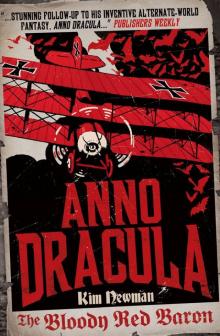 The Bloody Red Baron
The Bloody Red Baron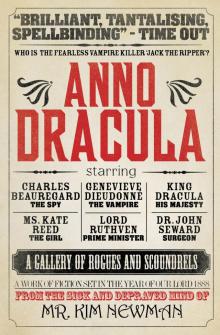 Anno Dracula
Anno Dracula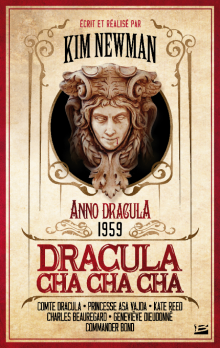 Dracula Cha Cha Cha
Dracula Cha Cha Cha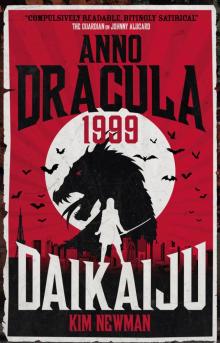 Anno Dracula 1999
Anno Dracula 1999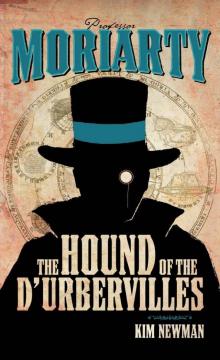 Moriarty: The Hound of the D'Urbervilles
Moriarty: The Hound of the D'Urbervilles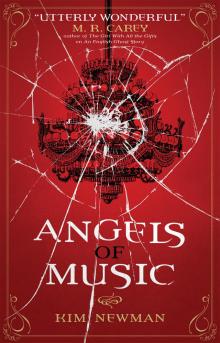 Angels of Music
Angels of Music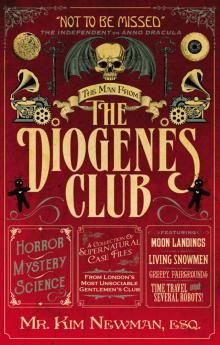 The Man From the Diogenes Club
The Man From the Diogenes Club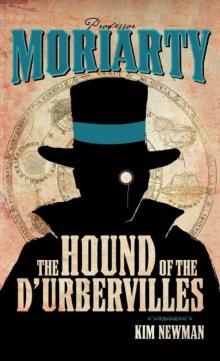 Professor Moriarty: The Hound Of The D’urbervilles
Professor Moriarty: The Hound Of The D’urbervilles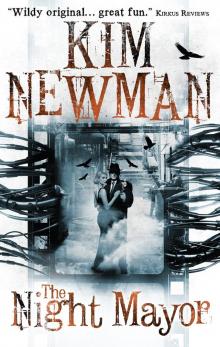 The Night Mayor
The Night Mayor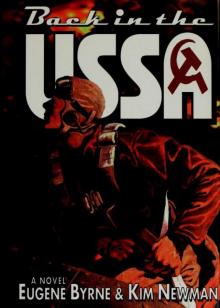 Back in the USSA
Back in the USSA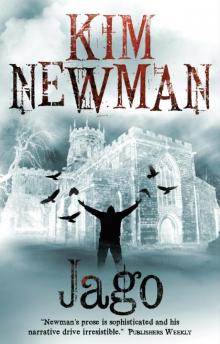 Jago
Jago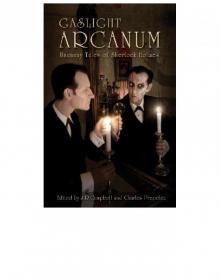 Gaslight Arcanum: Uncanny Tales of Sherlock Holmes
Gaslight Arcanum: Uncanny Tales of Sherlock Holmes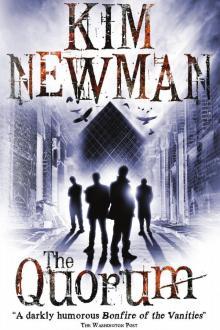 The Quorum
The Quorum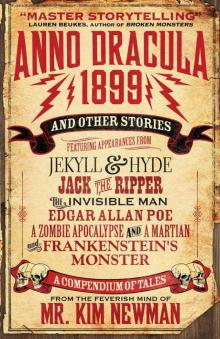 Anno Dracula 1899 and Other Stories
Anno Dracula 1899 and Other Stories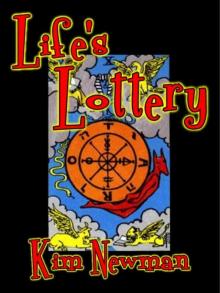 Life's Lottery
Life's Lottery The Secrets of Drearcliff Grange School
The Secrets of Drearcliff Grange School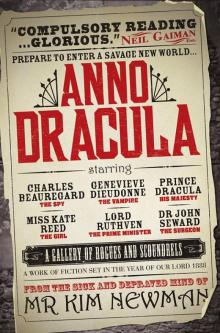 Anno Dracula ad-1
Anno Dracula ad-1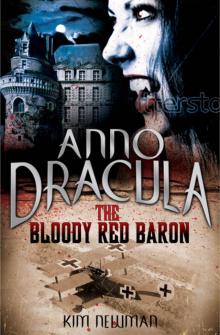 The Bloody Red Baron: 1918 ad-2
The Bloody Red Baron: 1918 ad-2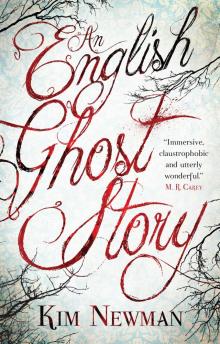 An English Ghost Story
An English Ghost Story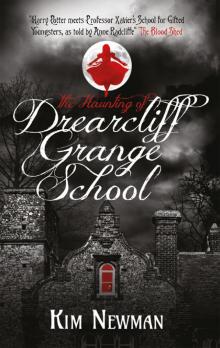 The Haunting of Drearcliff Grange School
The Haunting of Drearcliff Grange School The Other Side of Midnight
The Other Side of Midnight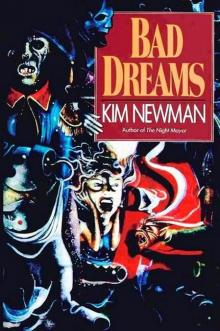 Bad Dreams
Bad Dreams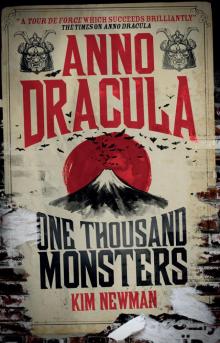 Anno Dracula--One Thousand Monsters
Anno Dracula--One Thousand Monsters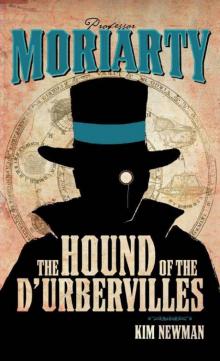 The Hound Of The D’urbervilles
The Hound Of The D’urbervilles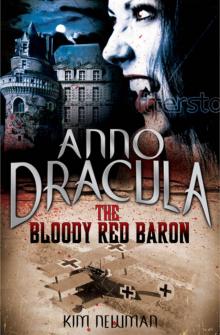 The Bloody Red Baron: Anno Dracula 1918
The Bloody Red Baron: Anno Dracula 1918